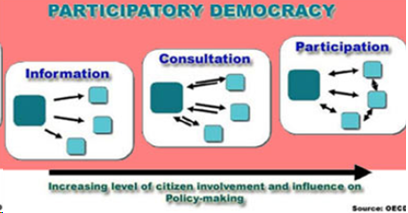| Participatory democracy is a type of democracy in which citizens have the opportunity to make decisions, either directly or indirectly, regarding laws and matters of state. Participatory democracy is closely related to direct democracy, but it usually wants to involve large numbers of people in political processes, ideally the entire citizenry. It works when individual citizens of a democracy participate in the elaboration of policies and laws through consistent engagement. The aim is to achieve breadth with the participation of all citizens who choose to be involved. This is the essence of democracy: the only way to ensure that the ‘people rule’ is for them to be involved in the decisions that affect them. Such a political system encourages a diversity of opportunities for political engagement. |

| Deliberative democracy wants to involve relatively small (but representative) groups of people, because it is very difficult to have deep deliberation among large numbers of people. |
Deliberative Democracy: Citizens’ assemblies within the government
Citizens’ assemblies are formed as a way of addressing matters about which governments are either unable or poorly constituted to do – they are a very real ‘by the people for the people’ event.

May 9.– Democracies are in varying states of frustration and anger as trust is lost in their politic. Alongside is an ever-growing number of the disenfranchised who have in effect become impotent spectators as to how they are governed. At the same time is an awareness that the reality of the vote is only keeping in place a situation that needs to change: “Conventional left/right politics are no longer viable – human nature is an inherent obstacle to cumulative ethical or political progress,” said philosopher John Gray.
Firstly, voting changes some things but not others, by in effect keeping them in place, for the party vote brings with it the ‘clothes’ of ‘institutional design’ – the collective of culture, identity, and history which shapes our politics and under which it functions. It is this subjection by a political framework that cannot be similarly objectified as can a party, as to why nothing ever seems to radically change. We vote for a party and by doing so endorse the ‘design.’
Secondly, party-affiliated politicians morph into camps of entrenchment, a red light for deliberation and a bed for adversarial politics. Neither are they necessarily or adequately informed, guided as they are by the paths of the ‘left or right’, party agenda and allegiance ...
[ Full text ]